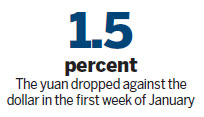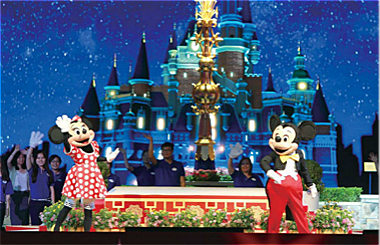Currency depreciation may prompt property sales
Updated: 2016-01-22 08:40
By Hu Yuanyuan(China Daily Europe)
|
|||||||||||
The yuan's depreciation against the dollar is likely to result in more foreign funds selling their assets in Beijing, especially those with holding periods that were extended for a short period of time, industry experts say.
In the first week of January, the yuan dropped 1.5 percent against the dollar, the largest weekly decline since August.
Liu Ligang, chief economist in the greater China region for ANZ, says the short-term volatility of the renminbi is partly due to rising anxiety over the weakening of the currency, triggering capital flight.
"A weakening yuan is also influenced by the start of a new rate-hike cycle in the United States and a slower Chinese economy, with growth in 2015 expected to register its slowest pace in a quarter of a century," Liu says.
Kevin Qin, head of capital markets for North China at international consultancy JLL, says the yuan's inclusion in the International Monetary Fund's special drawing rights basket in November is expected to result in more movement in the exchange rate. Changes to the US dollar exchange rate also are expected to affect investor behavior this year.
"In the case of foreign funds already holding assets in China, they will want to offload their assets as soon as possible, as the currency exchange is not in their favor," he says. "This could result in more buy opportunities as buildings appear for sale on the market. That may be good news for other funds, which are already under pressure to invest in value-add opportunities. More foreign investors will look at China."

At the same time, a weak exchange rate may trigger more outbound investment by investors that want to preserve the value of their portfolios by getting more exposure to other currencies.
"We've found an increasing number of smaller property developers and entrepreneurs quickening their pace in investing in the US and Europe, expanding to other nontraditional hot cities like Miami, Berlin and Frankfurt," says Grant Ji, head of China capital markets for Savills. "Buying US assets is a more lucrative choice."
No major en bloc deals were recorded in the fourth quarter of 2015, the quietest quarter of the year, as limited tradable assets and high pricing expectations on available assets greatly restricted deals.
Office space remains the hottest sector in Beijing, with much of this interest shifting outbound as investors look to diversify - JLL's research shows uncertainty in the China market, as the economic slowdown has made it harder for investors to reap the same rewards as before.
While the office rental growth outlook has softened, pricing has not yet taken this into account, and prices remain extremely high.
"Even investors who make bad decisions used to be protected by the good market and favorable currency situation, but that's no longer the case," Qin says. "Decisions are a lot more complicated now. While there is still interest in the market, there is also hesitation, as investors want to see cash flow stability and a clear exit strategy."
huyuanyuan@chinadaily.com.cn
Related Stories
Weaker renminbi is upshot of looser policy, say economists 2016-01-12 20:07
IMF reform 'set to raise renminbi's global profile' 2015-12-21 10:50
Stability in renminbi expected 2015-12-11 06:48
Chinese companies may list renminbi shares on Frankfurt bourse in 2016 2015-12-09 07:37
Today's Top News
Global push
AIIB chief vows to run clean, lean, green institution
'More Europe' to deal with 'triple crisis'
China gives beleaguered Tsipras a helping hand
China injects note of confidence in Davos
China and Gulf nations resume free trade talks
IMF starts to select new chief
Merkel insists on European solution for refugee crisis
Hot Topics
Lunar probe , China growth forecasts, Emission rules get tougher, China seen through 'colored lens', International board,
Editor's Picks

|

|

|

|

|

|






